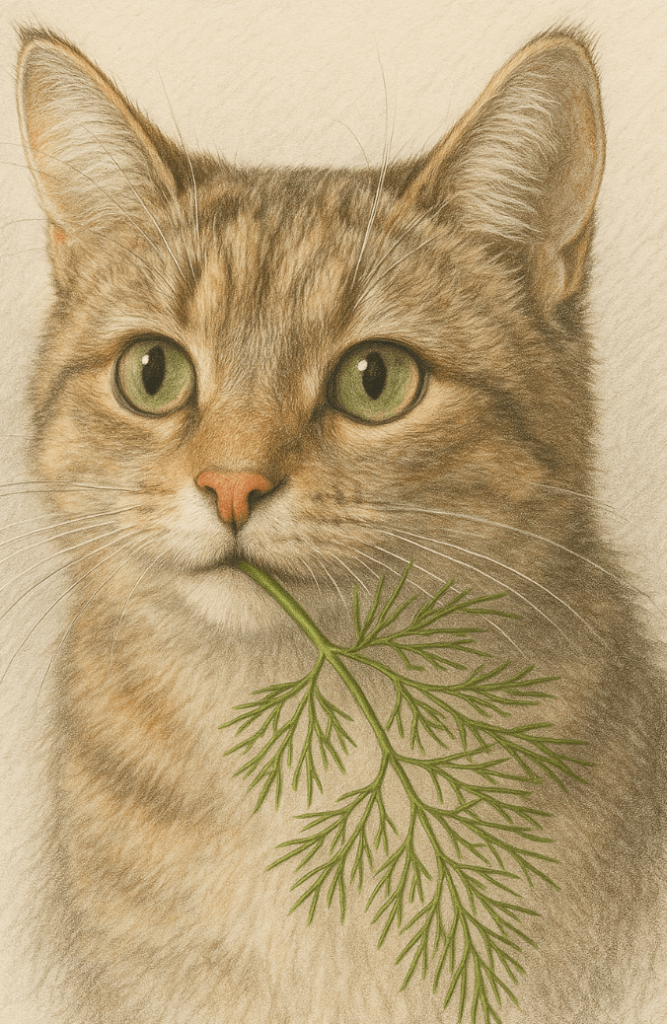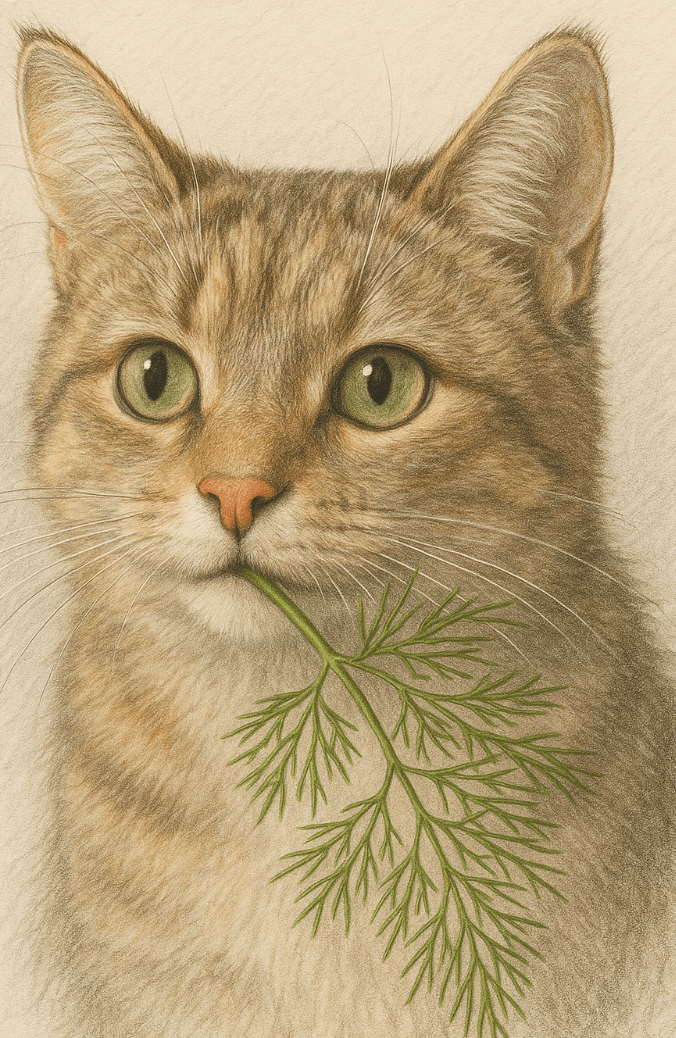Can Cats Eat Dill?
As a cat owner, you may have wondered whether your feline friend can safely nibble on herbs like dill. While cats are obligate carnivores and primarily rely on meat for their nutrition, they sometimes show curiosity about plants or herbs in their environment. Dill, with its fresh aroma and delicate leaves, might catch your cat’s attention—but is it safe for them to eat? In this blog post, we’ll explore the potential benefits, risks, and precautions of feeding dill to your cat. Whether you’re considering adding a sprinkle of dill to their food or simply want to ensure their safety around this herb, we’ve got you covered with expert advice and practical tips.
Is Dill Safe for Cats? Key Considerations
Dill is generally considered non-toxic to cats, but there are important factors to keep in mind before allowing your cat to consume it. Here’s what you need to know to ensure your cat’s safety.
Non-Toxic Classification:
According to veterinary guidelines, dill is not listed as toxic to cats, making it safer than many other herbs or plants.Moderation is Crucial:
While dill isn’t harmful in small amounts, excessive consumption can upset your cat’s digestive system.Potential Allergic Reactions:
Some cats may be sensitive to certain herbs, including dill, and could experience mild allergic reactions like itching or sneezing.Avoid Seasoned or Processed Dill:
Dill used in cooking often contains added salt, spices, or oils, which can be harmful to cats. Always use plain, fresh dill if offering it to your pet.Monitor for Digestive Issues:
If your cat consumes dill and shows signs of vomiting, diarrhea, or lethargy, consult your veterinarian promptly.
By keeping these considerations in mind, you can safely introduce dill to your cat’s diet without compromising their health.
Potential Benefits of Dill for Cats
While cats don’t require herbs in their diet, dill can offer some minor benefits when consumed in moderation. Here’s how this herb might positively impact your feline companion.
Supports Digestive Health:
Dill contains compounds that may help soothe mild digestive discomfort, such as gas or bloating, in cats.Rich in Antioxidants:
The antioxidants in dill can contribute to overall cellular health and support your cat’s immune system.Natural Breath Freshener:
Chewing on small amounts of fresh dill may help reduce bad breath by neutralizing odors in your cat’s mouth.Encourages Hydration:
Adding finely chopped dill to wet food can make meals more appealing, encouraging picky cats to drink more water.Provides Mental Stimulation:
Exploring new textures and flavors, like dill, can engage your cat’s senses and provide enrichment.
Though not essential, these benefits make dill a harmless and occasionally helpful addition to your cat’s diet.
Check this guide 👉Can Cats Eat Potato? Best 7 Expert Tips!
Check this guide 👉Can Cats Eat Plantains? Best 7 Expert Tips!
Check this guide 👉Can Cats Eat Cake? Best 7 Expert Tips!

Safe Herbs for Cats | Herbs to Avoid Feeding Cats |
|---|---|
Dill | Garlic |
Parsley | Onions |
Basil | Chives |
Catnip | Mint |
Rosemary (in small amounts) | Sage |
How to Safely Introduce Dill to Your Cat
If you decide to let your cat try dill, it’s important to do so carefully and in a controlled manner. Follow these steps to minimize risks and maximize enjoyment.
Start with Small Amounts:
Offer a tiny piece of fresh dill to see how your cat reacts before giving larger portions.Use Organic Dill Only:
Ensure the dill is free from pesticides or harmful chemicals that could harm your cat.Avoid Mixing with Other Ingredients:
Serve dill plain, without any added seasonings, oils, or sauces that could irritate your cat’s stomach.Observe for Adverse Reactions:
Watch your cat closely after they consume dill to check for any signs of discomfort or allergies.Consult Your Veterinarian:
If you’re unsure about introducing dill or other herbs, seek professional advice tailored to your cat’s needs.
Taking these precautions ensures a safe and positive experience for your curious feline.
Signs Your Cat May Not Tolerate Dill
While most cats can tolerate small amounts of dill, some may react negatively. Recognizing these signs early can help you act quickly to protect your pet.
Gastrointestinal Upset:
Symptoms like vomiting, diarrhea, or excessive drooling may indicate digestive irritation caused by dill.Lethargy or Weakness:
A sudden lack of energy or reluctance to move could signal an adverse reaction to the herb.Excessive Scratching or Itching:
Allergic reactions to dill may manifest as skin irritation or persistent scratching.Loss of Appetite:
If your cat refuses to eat after consuming dill, it could be a sign of discomfort or illness.Difficulty Breathing:
In rare cases, severe allergic reactions may cause respiratory issues—seek emergency care immediately.
Being vigilant about these symptoms ensures your cat remains healthy and happy.
Common Mistakes When Feeding Herbs to Cats
Feeding herbs to cats requires careful consideration to avoid mistakes that could harm your pet. Here are some pitfalls to watch out for.
Assuming All Herbs Are Safe:
Many herbs, like garlic and onion, are toxic to cats despite being safe for humans. Always research before offering.Overfeeding Herbs:
Even safe herbs like dill can upset your cat’s stomach if given in large quantities. Stick to small amounts.Using Store-Bought Seasonings:
Pre-packaged herbs often contain additives that are unsafe for cats. Use fresh, organic options instead.Ignoring Individual Sensitivities:
Every cat reacts differently; what’s safe for one may not be for another. Monitor your cat closely.Forcing Your Cat to Eat Herbs:
If your cat shows no interest in dill or other herbs, don’t force them—it’s not essential to their diet.
Avoiding these mistakes ensures a safe and positive experience for your cat.
Alternatives to Dill for Feline Enrichment
If you’re looking for ways to enrich your cat’s diet or environment beyond dill, consider these alternatives.
Cat Grass:
Specially formulated grass blends are safe for cats and satisfy their natural urge to chew on greens.Catnip Toys:
Catnip-infused toys provide mental stimulation and entertainment without dietary risks.Parsley Sprinkles:
A pinch of fresh parsley can freshen breath and add variety to wet food.Interactive Feeders:
Puzzle feeders and treat-dispensing toys engage your cat’s mind and body without relying on herbs.Hydration Boosters:
Flavorless water enhancers designed for cats encourage drinking and improve hydration.
These alternatives cater to your cat’s instincts while prioritizing their health and happiness.
Understanding Your Cat’s Natural Herb Behavior
Cats’ curiosity about herbs like dill stems from their innate instincts to explore their surroundings. Here’s why they exhibit this behavior.
Exploratory Nature:
Cats are naturally inquisitive and enjoy investigating new scents and textures.Chewing Greens for Digestion:
Some cats chew on grass or herbs to aid digestion or induce vomiting if they feel unwell.Mimicking Wild Instincts:
In the wild, cats occasionally nibble on plants as part of their natural foraging behavior.Scent Attraction:
The aromatic oils in herbs like dill can attract cats due to their heightened sense of smell.Boredom Relief:
Chewing on herbs may serve as a form of mental stimulation for indoor cats seeking entertainment.
Understanding these behaviors helps you better meet your cat’s needs while keeping them safe.
Frequently Asked Questions About Cats and Dill
Can kittens eat dill?
Kittens have more sensitive digestive systems, so it’s best to avoid giving them dill until they’re older.
What if my cat accidentally eats dill?
A small amount of plain dill is unlikely to harm your cat, but monitor them for any unusual behavior.
Can I grow dill at home if I have cats?
Yes, growing dill indoors or outdoors is safe as long as your cats don’t overindulge in the plant.
Does dill improve my cat’s coat?
While dill isn’t specifically known for improving fur quality, its antioxidants may indirectly support skin health.
Are there better herbs for cats than dill?
Catnip and parsley are generally more beneficial and enjoyable for cats compared to dill.
Final Thoughts on Cats and Dill
While dill is not toxic to cats, it’s not a necessary part of their diet either. Offering this herb in moderation can be a fun way to introduce variety, but always prioritize your cat’s primary nutritional needs. By understanding the potential benefits and risks, as well as taking precautions, you can confidently include dill in your cat’s occasional treats. Remember, every cat is unique, so pay close attention to their preferences and reactions. With proper care and supervision, you can ensure your feline friend enjoys exploring new flavors safely.
Do Cats Have Taste Buds? Best 7 Expert Tips! – Discover how cats experience flavors and why their taste is so unique.
Do Dogs Have Taste Buds? Best 7 Expert Tips! – Discover how dogs experience taste, their preferences, and what it means for their diet and health.
Can Cats Taste Sweet? Best 7 Expert Tips! – Discover why cats can’t taste sweetness, how it affects their diet, and tips to keep them healthy and happy.
Can Dogs Taste Sweet? Best 7 Expert Tips! – Discover how dogs perceive sweetness, which foods are safe, and tips to manage their sweet cravings responsibly.





